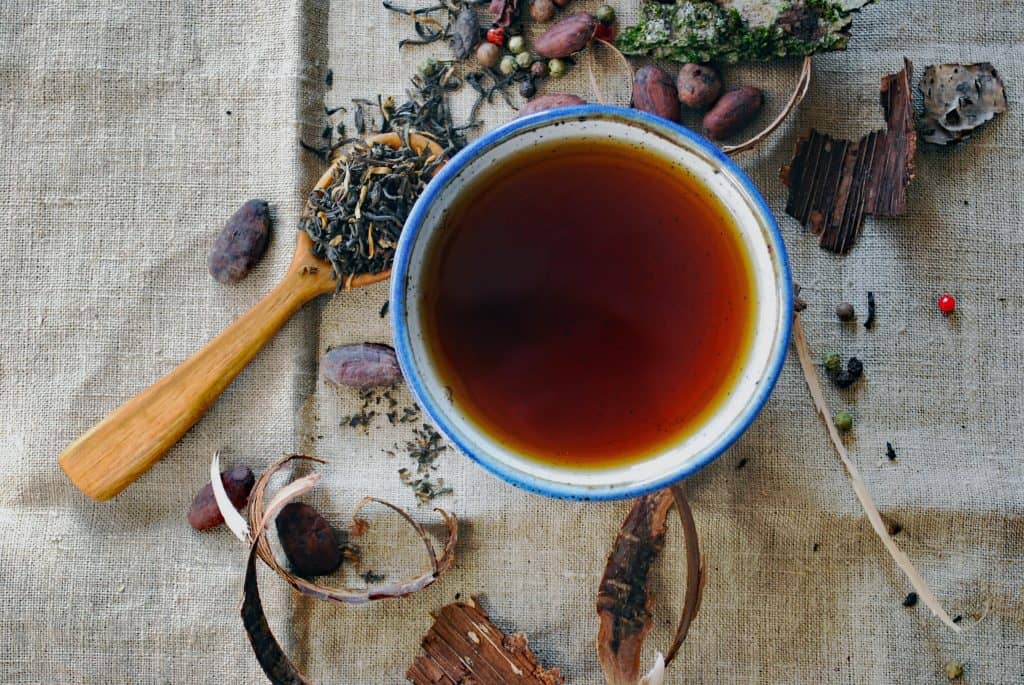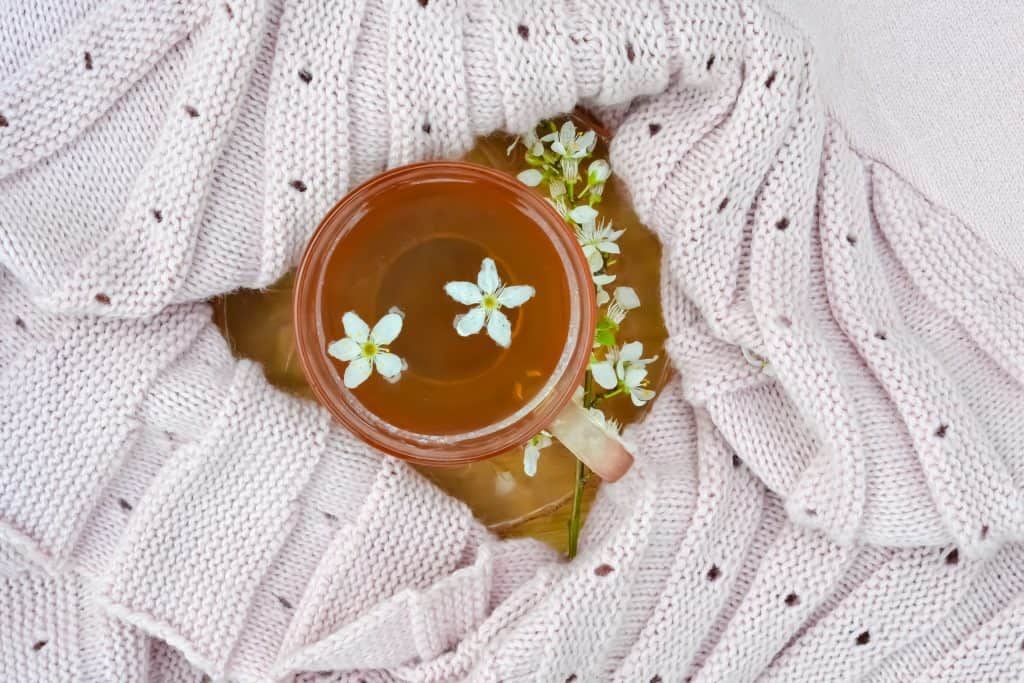If you’ve ever had a cup of tea and experienced a wash of acid reflux in your throat you’ve probably wondered – is tea acidic? And should I be drinking this?
Black teas and some herbal teas including peppermint tea have a reputation for triggering acid reflux symptoms, but it’s not all to do with their pH.
Here’s everything you need to know about tea, acidity, and the best teas for acid reflux.

Contents
Is Tea Acidic?
Acidity is measured on the pH scale from 0-14. The lower the number on the pH scale, the more acidic something is. The higher it is, the more alkaline (or basic). For reference, vinegar, lemon, and orange juice, are considered to be acidic (pH < 7.0). Pure water is neutral (pH = 7.0). While tap water, almond milk, and various veggies tend to be more basic (pH > 7.0).
But where does that leave tea? Well, it depends.
Most teas tend to be mildly acidic, but depending on the conditions in which your tea leaves were grown and prepared, and the concentration of leaves in your brew, this could vary.
In general black, puerh and oolong teas are mildly acidic (pH between 4.9 – 7.0) , while green and white teas are usually more alkaline (pH between 6.7 – 10.0).
What makes some teas more acidic than others?
Teas that undergo longer oxidation (black, pu-erh, and oolong teas) are usually more acidic than teas that undergo no to little oxidation (green, and white teas). This is because during the oxidation process, different compounds are broken down and organic acids form – affecting the overall pH of your tea leaves.

Besides oxidation, other things that can influence the acidity of your beverage is the addition of juices and alcohol. So if you’re drinking bottled tea-based beverages, cocktails, or bubble teas, and are trying to be cautious with drinking acidic drinks this might be something to watch out for.
Do acidic teas make your stomach more acidic?
Contrary to what you might have heard, no amount of acidic foods or beverages will make your stomach more acidic because stomach acid is way more acidic than any food you could consume.
However, acidic foods and beverages – including teas – can irritate the esophagus (the tube connecting your throat to your stomach), and trigger stomach acid from the esophagus into the throat – which is why some people experience acid reflux after drinking tea.
What teas are good for acid reflux?
If you want to enjoy tea but struggle with acid reflux, you might be wondering, what teas are okay and which ones should you avoid?
Here are my recommendations.

Stick with herbal teas and avoid acidic, caffeinated, or spiced teas
Earl grey, chai, fruit teas, and black teas are some of the most popular teas enjoyed worldwide, but the acidity, caffeine, and spice in these teas can relax the lower esophageal sphincter (LES) and cause acid to reflux.
If you have a sensitive digestive system, herbal teas like chamomile, rice, rosehip, and less oxidized teas like white, and some green teas in moderation are your best bet. These teas tend to be in the more neutral to alkaline pH range (i.e. pH ≥ 7), and easy on your digestive system.
Is Peppermint tea good for acid reflux?
You’ve probably heard that peppermint tea is really great for digestion. And while there is some truth to this, not everyone reacts well to it. Peppermint tea is alkaline (pH ~8.0) and promotes digestion , but it also relaxes your LES – which can exacerbate acid reflux symptoms. If you have some peppermint leaves laying around, try brewing yourself a cup with plenty of water and seeing how you feel.
Is Ginger tea good for acid reflux?
Ginger is rich in antioxidants and anti-inflammatory compounds including gingerol, but is it good for acid reflux?
Ginger tea is alkaline (pH~7.0-7.5) and while studies suggest that it can reduce nausea, its effectiveness in easing acid reflux is yet to be well understood. If you want to give ginger tea a go, brew your tea with a small amount of fresh ginger and see how you feel.
Other ways to make your tea less acidic and alleviate acid reflux
Sometimes herbal teas just aren’t your cup of tea and what you want is a nice cup of earl grey in the morning to wake you up – minus the reflux. What do you do then?
If you want to make your tea less acidic and alleviate acid reflux, here are 8 things you can try.
- Add more water to your brew: Pure water has a pH of 7, which decreases acidity. Adding more water to your tea can also reduce the caffeine, which can help alleviate symptoms.
- Don’t drink tea on an empty stomach: Eat something before your tea to avoid irritating your digestive system.
- Reduce the number of tea leaves (or bags) you use: A higher concentration of leaves can increase the concentration of caffeine in your brew. If you’re sensitive to caffeine, cut down on how much tea you use.
- Add almond milk to your tea: Cow milk is just a little acidic, but almond milk is basic and may help neutralize the acidity of your tea.
- Try cold brewed teas: Cold brewing can reduce the amount of caffeine diffused in tea. Just remember to brew your tea for a shorter period or stick with less oxidized and herbal teas.
- Avoid overeating, heavy exercise, and laying down after meals: Eating large meals with tea, drinking too much tea, and even exercising and laying down too soon after tea can relax the LES leading to acid reflux.
Final Thoughts
Many teas, especially those that undergo longer oxidation periods like black and pu-erh teas are mildly acidic and can trigger acid reflux symptoms. But acidity isn’t everything. Teas that are more caffeinated, contain naturally stimulating compounds and additives like fruit juice, spices, and alcohol can also trigger acid reflux. In addition, how and when you prepare your tea, exercise, eat, and sleep can also influence how you feel.
At the end of the day, if you’re not experiencing joy after a cup of tea, it’s time to switch things up.
If you have a sensitive tummy, sticking with herbal teas like chamomile or white teas and making small changes to how you prepare and consume your tea can make a huge difference.
Leave a Reply